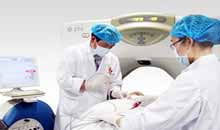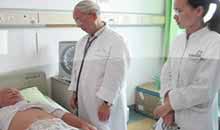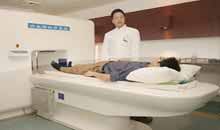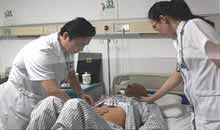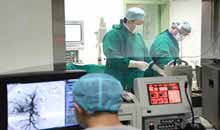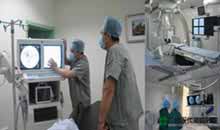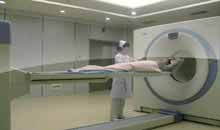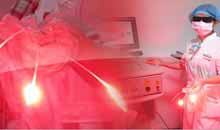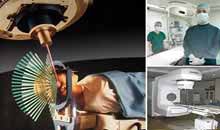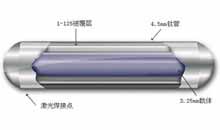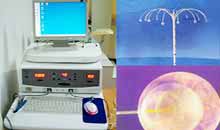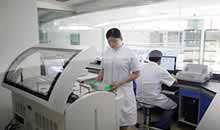- Basic
- Symptoms
- Diagnosis
- Treatments
What is Kidney Cancer?
Kidney cancer is a kind of malignancy starts in epithelium of uriniferous tubule and can happens in any parts of renal parenchyma. Normally it grows slow, except some special cases. The primary tumor in kidney can develop step by step to encroach on the tissues and organs around or metastases to other distant organs through lymphatic vessels or veins.
Incidence of Kidney Cancer
Kidney cancer is a most common malignancy in urinary system, whose incidence accounts for 3%-6% of all malignant tumors. With a ratio about 2:1 between male and female patients, it may occur in various ages and mostly happens in an age range of 50-70.
Survival Rate of Kidney Cancer
There are many factors affecting the survival rate of kidney cancer. Generally, the survival rate for the patients who have removed kidney within 5 years is 35%~40%, when for 10 years is 17%~30%. Since the prognosis of kidney cancer is hard to estimate that metastases may occur 20 - 30 years or even longer after nephrectomy.
Causes of Kidney Cancer
Although the incidence of kidney cancer is high, the exact cause of it is still unknown. It may be a combined result of many risk factors.
1) Smokers. The risk is high for those people who have been smoking without filter for more than 30 years to develop kidney cancer.
2) Obesity and high blood pressure. These are the two risk factors leading to male kidney cancer.
3) Occupation. The incidence and death rate of kidney cancer would increase in those people involved in printing, coke, dry-clean and petrochemical processing.
4) Radiation. The people who have been exposed in some weak radiation for long would increase the risk of taking kidney cancer.
5) Heredity. The ones whose family members have suffered from kidney cancer get a higher incidence.
6) Food and drugs. According to researches, high intake of milk product, animal proteins and fat, low intake of vegetables and fruits are the risk factors of kidney cancer.
What kinds of supports can be obtained?
Practice proves that the clinic team services composed by multiple disciplines like oncosurgery, oncology, pathology, imageology and anesthesia doctors as well as professional nurses, can provide patients with most effective, most suitable and most economic treatment plan, and also can greatly improve the therapeutic effect of treating cancer patients.
“One station” medical system constructed by Modern Cancer Hospital Guangzhou combining multiple disciplines, can perform comprehensive diagnosis and treatment for patients under the condition of without adding patients’ burden. Therefore, on one hand, it can provide all-round and heartfelt medical services, and on the other hand, it improves medical efficiency and level. There are many channels can be applied to conduct the communication between patients and doctors, like online consultation, email, telephone conversation, and face-to-face consultation. All these consultation services can effectively help patients to fight the cancer. While the medical team faced by the patients includes doctors, nurses, dietitians, interpreters and so on to meet various demands in different level of different countries. Patients would be more confident under the unobstructed communication environment to cooperate the hospital to diagnose and treat the diseases.
Different manifestations of kidney cancer are caused by different reasons. Clinically, the symptoms are usually the most direct reflection of kidney cancer, which do great help to the diagnosis and treatments. Concerned about kidney cancer symptoms is critical important to the judgment and treatments of kidney cancer patient's condition.
The chief complaints and clinical manifestations of kidney cancer patients are changeable, so it is easily to be mistaken as other diseases. Since the hidden kidney position, the main perceivable sign of kidney cancer is urine. Hematuria or bloody urine is the most common symptom of kidney cancer, but which usually appear only after the tumor invades to the pelvis. In some words, bloody urine is not an early symptom of breast cancer.
No obvious symptoms: At present, more than 40% of the kidney cancer patients are accidentally found in physical examination or other regular medical tests since there are no obvious signs or symptoms in the early stage. However, the prognosis of majority of early stage kidney cancer patients is very good. Therefore, regular medical check-ups are very important.
Typical local symptoms: Hematuria or bloody urination, pain and lumps are three main symptoms of kidney cancer. Most of the patients may show 1 to 2 symptoms when they are diagnosed, very few people would have all the three symptoms, which may only accounting for about 10%.
Bloody urination: When bloody urination occurs, there is no sense of pain, and the outbreak is intermittent but visible by naked eyes. The intermittence will be shortened with the development of the cancer. A great amount of bleeding may be associated with renal colic.
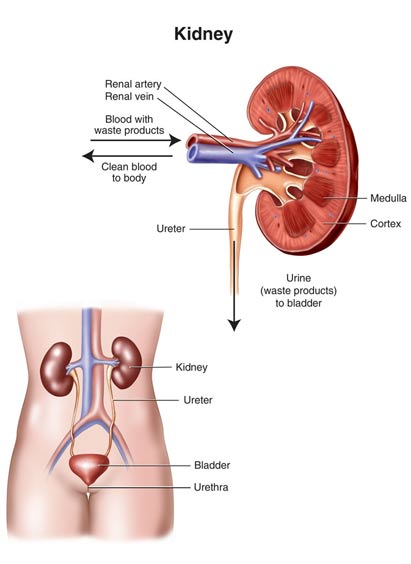
Pain: Pain, met in 50% of the cases, is also an advanced symptom of kidney cancer. It appears due to the gradually compression of the growing tumor to the renal capsule or renal pelvis. Or persistent waist dull pain caused by the invasion of tumor to the surrounding organs and psoas.
Lump: lumps are also a common symptom of kidney cancer. Enlarged kidneys can be seen in about 1/ 3 to 1 / 4 kidney cancer patients when they see a doctor. Due to the hidden position of kidneys, the lumps are very difficult to find before growing to a certain volume. When the mass is palpable in abdomen, the patients have usually been in the advanced stage.
Systemic manifestations: Commonly, 10% to 40 % of the patients may accompany with paraneoplastic syndrome, which may manifest as high blood pressure, anemia, weight loss, cachexia, fever, polycythemia, abnormal liver function, hypercalcemia, hyperglycemia, elevated ESR (erythrocyte sedimentation rate), or neuromuscular pathological changes. About 2% to 3 % of the cases could show varicocele of the spermatic vein or abdominal wall varices.
Metastatic symptoms: Approximately 10% of the patients visit the doctor because of a metastatic symptoms and 30% of the newly diagnosed cases show metastatic signs. Metastatic symptoms of kidney cancer can be bone pain, fracture, cough and spitting of blood.
Experts from Modern Cancer Hospital Guangzhou remind you that the clinical manifestations of kidney cancer are changing individually. If you are happening to the above symptoms, consult a professional doctor in a timely manner and do necessary examinations as soon as possible.
Kidney cancer is the most common malignant cancer of urinary system. Its incidence among male is twice of that among female. Benign cancers of kidney often has no symptoms, otherwise, they are probably malignant cancers. Symptoms of kidney cancer usually are not particular. Instead, symptoms of non-urinary system, unreasonable fever for example, are often the early signs of kidney cancer. Once it occurs, one should go to hospital for diagnosis timely.

Kidney cancer detection
1. General examination: when the tumor invades pelvis and kidney calices, there will be abnormal amount of red blood cells revealed by urine routine examination. However, even if urine routine examination proves normal, possibility of kidney cancer still cannot be excluded.
2. X-ray examination: it is very important diagnosis method of kidney cancer. Moreover, as the techniques and equipments are being improved constantly, the accuracy of X-ray examination is evidently improved.
a. KUB (kidney, ureter and bladder): KUB will show irregularly enlarged kidney in the lesion, blur psoas major, and 10% of the inner or outer tumor being calcified.
b. Pyelography: Intravenous pyelography and retrograde pyelography are the basic diagnosis methods of kidney cancer.
c. Abdominal aorto-renal arteriography: it is an important method to detect early kidney cancer and determine its nature.
d. Inferior vena cavography: 5%-15% kidney cancer patients have tumor embolus in the vein. Radiography can reveal whether there is tumor embolus in the inferior vena cava and kidney vein, or whether there are cancer compression and infiltration to the inferior vena cava.
3. CT examination: CT examination is mainly used in diagnosing the space-occupying lesion of kidney. It has high accuracy in identifying both cystic and solid masses.
4. MRI examination: it can clearly reveal solid kidney masses and distinguish them with kidney cysts.
5. Ultrasound: it can reveal the coverage of the kidney cancer and check whether there is infiltration to nearby organs, like liver and spleen, or swollen lymph nodes of kidney pedicle and retroperitoneum. It is very helpful in clinical staging of kidney cancer.
6. Radionuclide examination: Radioactive nuclide is of great value in kidney function inspection. Meanwhile, imaging techniques can reveal the condition of the kidney and check whether it is functioning normally. Radionuclide examination is suitable for those who cannot undergo X-ray imaging examination.
Experts from Modern Cancer Hospital Guangzhou remind that patients can choose any of above examination methods according to their own condition. As early stage kidney cancer usually has no obvious symptoms, regular routine examination is helpful in early detection of this disease.
Many kidney cancer patients can have their condition effectively controlled if diagnosed and treated early. There are many kidney cancer treatment methods, including Chinese medicine and Western medicine, either of which has its own unique effects in the treatment. Kidney cancer treatment includes surgical resection, radiotherapy, chemotherapy, immunotherapy, traditional Chinese medicine or combination of these methods.
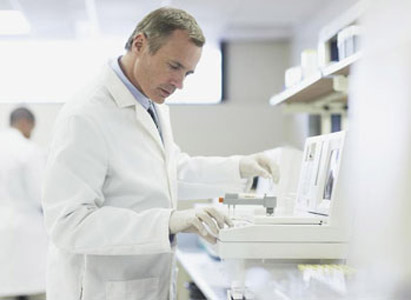
1. Surgical treatment of kidney cancer:
a. Nephrectomy: this surgery will remove the entire kidney, adrenal gland and adipose tissue around the kidney, as well as the nearby lymph nodes. Most patients, therefore, have to rely on one single kidney to filter urine.
b. Lymph node dissection: When the cancer has reached the lymph nodes, many doctors during surgery will perform lymph node dissection to remove the lymph nodes.
c. Partial nephrectomy: to remove the kidney tissues invaded by tumor.
d. Resection of metastases: to remove the transferred tumors so as to relieve the patient's pain and symptoms.
2. Green chemotherapy: The use of chemical drugs to kill cancer cells and inhibit tumor cell growth and reproduction. Traditional chemotherapy can cause decline of the human immunity and damage normal tissue cells. However, an improvement to the traditional chemotherapy can properly make up its shortcoming while exerting its advantages. As a result, the side-effect is reduced, thus, damage to the human body is cut down.
3. Radiotherapy: the use of radioactive rays, such as X-ray, γ- rays and electronic beam, to irradiate the cancerous tissues, so as to massively kill the cancer cells and damage the cancerous tissues with the biological effect of the radiation. Radiotherapy is widely used as assistant treatment before or after surgery of kidney cancer, as well as to ease the pain and other symptoms caused by metastatic kidney cancer.
4. Immunotherapy: treatment techniques of killing cancer cells with cultured cells. Firstly, in vitro culture of mononuclear cells is carried out. Later, the mononuclear cells is induced and differentiated into dendritic cell (DC). Lastly, induce the CIK with the antigen-stimulated DC to endow it with tumor-killing specificity. That is to culture DC and CIK cells together to form a tumor-killing cells group.
5. Chinese medicine treatment: there are two keys in treating advanced kidney cancer. One is to eliminate the invading pathogenic factors, and the other is to reinforce the patient’s healthy qi. The later is particularly important. Chinese medicine is a widely used systemic treatment method. It has great effect in reinforcing the patient’s physique and strengthening the treatment effect. Chinese medicine is a unique treatment method of China. It has evident effect in treating advanced kidney cancer and can effectively eliminate patients’ painfulness.
Experts from Modern Cancer Hospital Guangzhou said that, after cancer diagnosis and staging, doctors usually will work out a specific treatment plan. It is very important for patients to think about the choice of treatment, which is mainly affected by the stage of the cancer and the condition of the patient. Others, like whether it can prolong life and eliminate the symptoms are also factors that affect the choice of treatment.
If you have any questions, please contact us via online consultation, email or phone call. If you find our website useful, please follow our FaceBook and YouTube, health information will be updated regularly.





